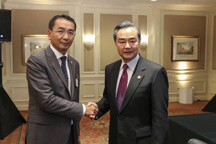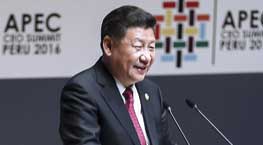By Xinhua writers Zhang Zhongkai, Wang Xiuqiong
BEIJING, Dec. 21 (Xinhua) -- China was once a gold mine for foreign firms, but the country's economic slowdown is making it harder for multinationals to make easy money.
Foreign direct investment (FDI) in the Chinese mainland slowed in the first 11 months compared with last year, official data shows.
A recent survey of German firms in China showed that the current economic situation is one of the most difficult in recent years, and about 25 percent of the firms expect shrinking profits this year.
However, others have pointed out that the Chinese market poses huge opportunities as long as companies are digging in the right areas.
"We are upbeat about the outlook of the Chinese market, one of our fastest growing markets globally. China's new two-child policy and consumption upgrading means growing demand for high-quality toys," said Amon Wang, marketing vice president with LEGO China.
The Danish toy maker opened its first factory in Asia in eastern China's Zhejiang Province in November, just six months after it opened its largest ever store, at the Shanghai Disney Resort. LEGO aims to set up outlets in 40 Chinese cities by 2020.
As trade and investment slows, consumption is playing a bigger role in driving China's economic growth, contributing to over 70 percent of total GDP in the first three quarters.
While facing a dwindling workforce and rising labor costs, China is also offering more high quality talent, according to business social network LinkedIn.
LinkedIn's registered users in China grew from about 4 million in 2014 to over 28 million today.
"Chinese people are increasingly eager to learn knowledge and share expertise. They are more innovative and looking for changes, lending momentum to emerging sectors like the sharing economy," said David Yu, vice president of LinkedIn China.
While the workforce are seeking to improve themselves, China's companies are also busy optimizing their management and operations.
Digitalization is an ongoing trend among Chinese enterprises, and about 92 percent of surveyed companies are using IT solutions to upgrade their business, according to Ken Ho, director with CA Technologies China.
Official data showed that China's high-tech and strategic emerging sectors grew over 10 percent in the past 11 months. Growth of foreign direct investment flowing into computer application services more than doubled from a year earlier.
In addition to consumption, the Internet economy and high-tech services, China's urbanization and smart city drive also offer plenty of business opportunities for reform-minded foreign companies in traditional sectors.
According to Gao Yan, CEO with Thyssenkrupp Greater China, their elevator business in China outperforms many other markets, and their R&D investment in China has been growing steadily in the past five years.
The German company decided in mid-December to build the world's largest automobile steering system production base, in eastern China's Jiangsu Province, to cater to China's growth in automobile use due to greater urbanization.
Caterpillar looks forwards to more share of businesses using China's outbound strategy of the Belt and Road Initiative, as it views the strategy as "an open and inclusive" framework allowing all countries along the routes to participate in project construction.
The U.S. construction and mining equipment producer has seen rapid growth in business related to the Belt and Road projects in Southeast Asia, the Middle East and Russia this year.
"An additional 1 percent GDP growth for China means trillions of yuan in volume growth, so China still offers a remarkable huge market," Gao Yan said.
China will strengthen its efforts to introduce foreign investment in 2017, build a law-based business environment and prompt foreign-funded businesses to play a bigger role in stimulating the real economy, said a statement issued after the Central Economic Work Conference Friday.
"Foreign firms should also do their own homework and keep up with Chinese market changes," Gao added.










